


EARLIER THIS YEAR it was hard to imagine the day we would be back in our offices, hanging out by the watercooler with coworkers, teaching in a lecture hall or holding bake sales for student professional organizations (SPOs) in the lobby of Alter Hall.
And in fall 2021, many of those traditions were reinstated. To get a sense of how our community is stepping back into their pre-COVID-19 lives, we spoke to Professor Ravi Kudesia, Carly Papenberg of the Fox Online and Digital Learning team and Honors student Angel Cherian.
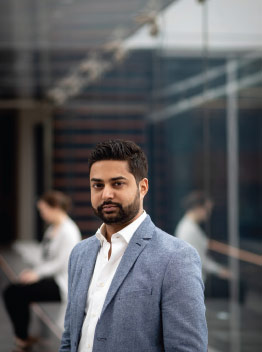
As workers across the U.S. shift back into in-person work arrangements, employees and employers alike are weighing the benefits and drawbacks of remote work to guide the future.
"In my MBA courses, I hear executives discussing the fact that employees' expectations have shifted," says Ravi S. Kudesia, assistant professor of human resource management at the Fox School. "Many people have found that they work effectively from home, so they're going to want to maintain that flexibility. They might receive resistance from managers, so my advice to anyone who's an employee is that now is your time to renegotiate your contract and your terms."
For Kudesia, having the flexibility to work and perform research on his own terms was a primary reason he became a professor. Prior to the pandemic, he would work from coffee shops around his apartment. So, much like his colleagues that call Alter Hall home base, Kudesia was also feeling untethered during the height of the lockdown.
"So that was one thing that changed—I tried to find alternative routines to get some balance. Sometimes it might look like taking more walks, or just taking a break by reading a book in the park. I've had to redesign routines so that I'm not feeling stuck at home, where working from home used to be a perk and not a requirement."
But with classes starting in person again, he is feeling motivated and energized and hopes when others return to the workplace, they feel the same.
"I've started teaching in person again, and it's just a type of feeling that I can't get otherwise. I felt like I could not express aspects of myself that I was used to expressing without in-person classes," he says. "In different situations, like working in the office versus at home, we inhabit different roles—we think about things differently, we act in different ways that can be really energizing."
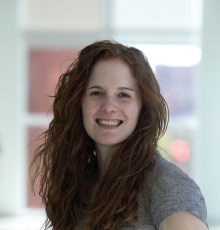
Despite excitement to dive back into in-person learning in the Fox community, it is worthwhile to think about the people and processes that made such a smooth transition to online possible in March 2020.
One of those people is Carly Papenberg, director of instructional design in the Online and Digital Learning Department. Within days of the first lockdown, the online and digital learning had faculty up-and-running in order to teach classes via Zoom.
"My team had been preparing guides, videos and workshops to support faculty prior to the pandemic," says Papenberg. "This allowed us to swiftly ramp up production of any needed materials and guides, as well as to launch more extensive support opportunities including increased office hours for Zoom and Canvas training, live in-class Zoom support and one-on-one meetings."
During the height of the pandemic, Papenberg's busy schedule made for even longer days—it was important to her that she was available to be a support system for faculty and staff. While that meant missing time with her two young daughters and husband, she had an internal support system that kept her on track.
"My husband is my rock," she says. "He really stepped up and helped support me, knowing that my effort was hopefully making a difference. This has ignited my passion for what I do and my desire to ensure that we as a community support one another and work together to make Fox and the School of Sport, Tourism and Hospitality Management as culturally inclusive and supportive as possible."
In addition to reigniting a passion for her job, Papenberg also learned the importance of communication.
"It is easy to tune out, overlook an email or not reach out to someone who hasn't been communicating," she says. "I had to forge connections with my team to ensure they knew I was there and available and make extra effort to support them as they went through the transition. Having a weekly meeting, even if it was just five minutes to say hello and ask how folks were doing, was key."
This semester, Papenberg's relationship with work-life balance will, and already has, steadied. Being back in the office part time allows her to set boundaries and limitations for when she is online and available. Seeing colleagues and setting pre-COVID-19 "start" and "end" times for work helped her find new motivation.
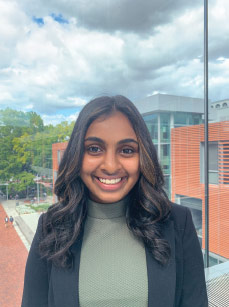
Like many of us in the fall 2020 first-year honors student angel cherian was bored.
"Because we were a little limited with what we could do, I spent my time exploring every opportunity—I ‘got cspd'd' by enrolling in canvas courses, I attended the virtual resume workshop and had my resume critiqued by a career coach," says cherian. "so once I set up my handshake profile, I started putting on filters and decided to see what internships would be applicable to me because I love being busy."
About being busy, Cherian is not joking. By the end of her first year as a management information systems major, she has joined Agni, Temple's female South Asian fusion dance team, Association for Information Systems, the dean's student advisory council and is the director of operations for the Fox College Council.
During summer 2021, she interned at Welcome America, serving on the sponsorship and marketing team. The Wawa Welcome America Festival is an annual series of celebrations held across the city leading up to Independence Day. Cherian supported things from event planning to organizing vendor contracts and more.
Starting out as a quiet person in high school, during her junior and senior years Cherian discovered her passion for leadership and desire to connect with others.
"I am so glad that I was in a dorm freshman year because even with COVID-19 restrictions, I still got to know people and form connections. I don't know what I would have done if I was sitting home alone," she says. "I realized I'm a people person, which is part of why I'm so excited to get back to in-person classes and meetings. We'll be doing dance competitions, I'll have office hours where people can meet with me. There will just be so much more opportunity for connection."
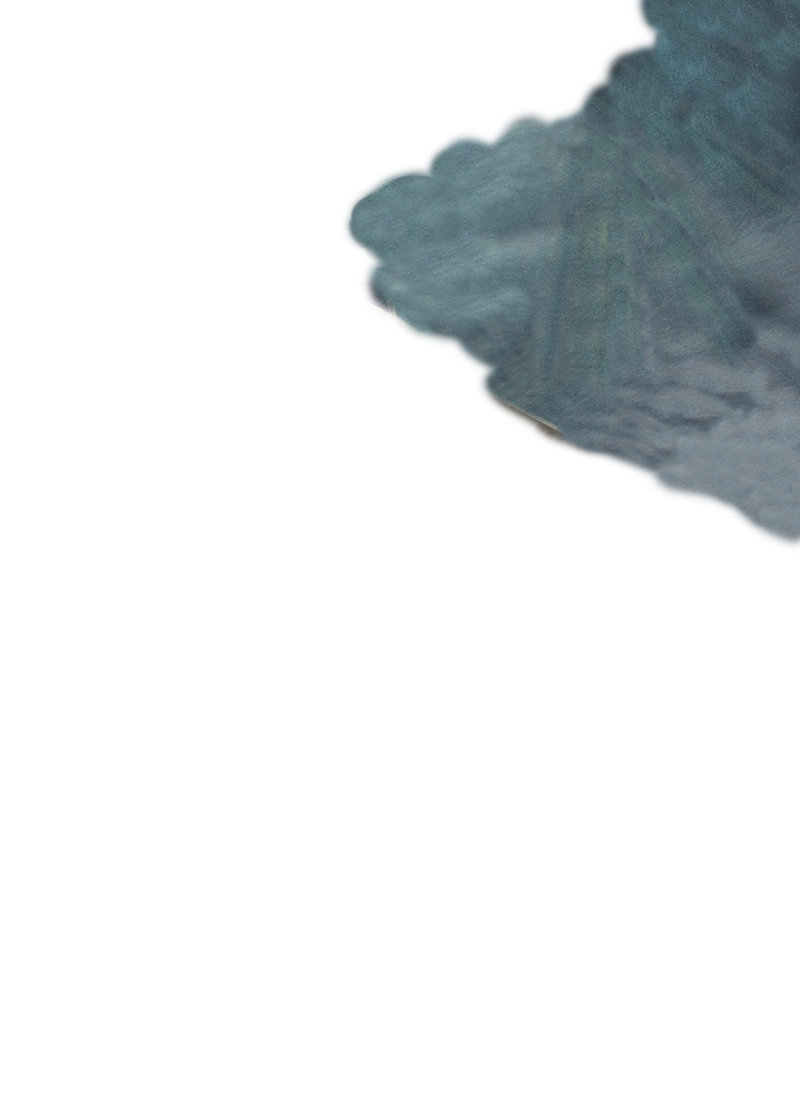


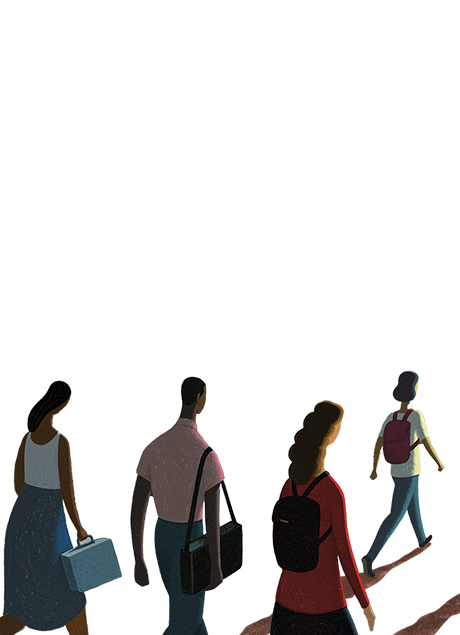

The word "hospitality" in business often describes services and attitudes that attend to travelers' needs in a pleasant way. Hospitality blurs the line between a place and a product, extending the comforts associated with home life into a collective experience cherished by the community at large.
When Philadelphia entered the first phase of lockdown in March of 2020, the hospitality industry was cut off from their ability to continue providing these services, which meant jeopardizing their ability to stay afloat.
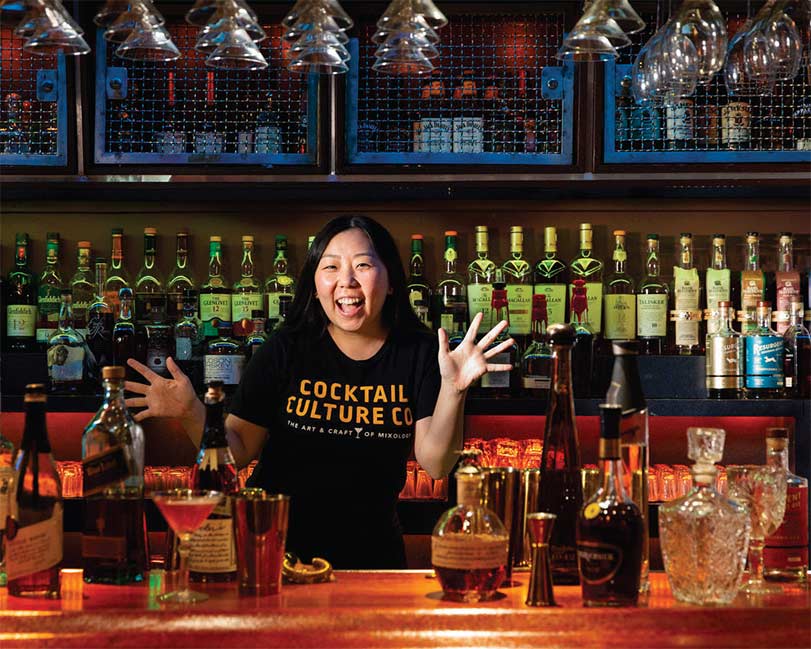
Jungeun Park, BBA '16, is one of the city's many entrepreneurs whose businesses were temporarily shuttered by the onset of COVID-19.
"I was on the phone all day with clients when they announced the shutdown," says Park. "We started getting raindrops of cancellations, then all at once buckets of water started falling on us. Three months worth of work went down the drain in one day."
Park is the founder of Cocktail Culture, an interactive mixology class that has received praise from media outlets such as Huffington Post. Her business proposal for Cocktail Culture even earned her a finalist position in the 2016 Be Your Own Boss Bowl competition, hosted by Temple's Innovation and Entrepreneurship Institute (IEI). Park continued to grow the company after graduating. At its height in 2019, she employed more than half a dozen instructors to teach classes. When the shutdown was announced, Park had to suspend operations, essentially cutting off her income stream entirely.
Park wasn't alone; businesses were anxiously awaiting answers and assistance from city, state and federal agencies that controlled the information and financial resources sent out in response to the impending shutdown. Challenges like making sense of the quickly changing directives, communicating appropriately with customers and preparing their finances to survive something akin to a hibernation threatened to devastate the industry and sent many businesses into a spiral of uncertainty.
The Center for Hospitality Resilience (CHR) emerged in direct response to the confusion and ensuing difficulties faced by small businesses at the time. Developed in partnership with Temple University's Small Business Development Center (SBDC) and the School of Sport, Tourism and Hospitality Management (STHM), CHR married the expertise of each respective organization into a single functioning entity.
Funded in part by grants awarded from the Small Business Administration (SBA), the center's mission is to provide programs and initiatives that could address the needs of Philadelphia's hospitality businesses.
Maura Shenker, director of Temple's SBDC, witnessed firsthand how the panic engulfed the business community.
"When the pandemic hit, we saw a significant increase in people reaching out to us for help," says Shenker. "We saw roughly 80 to 90 people contact us each day in March and April of 2020."
Ceridwyn King, associate professor at STHM, served as chair of the Department of Tourism and Hospitality Management during the formation of CHR. King and Shenker worked closely because of their overlapping expertise in both hospitality and small business development.
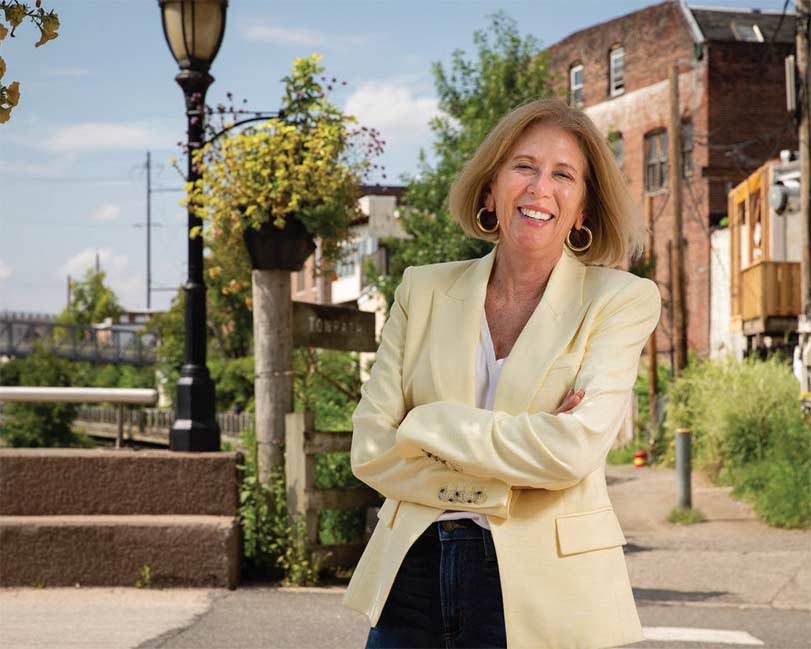
"SBDC was inundated with a lot of tourism and hospitality businesses wanting help, so they reached out to us and asked for assistance," says King. "I said to my colleagues, ‘If we are committed to researching and teaching in a field, and that field has been devastated by COVID-19 ... if we can't help now, I don't know what our purpose is.'"
Through the center, small businesses in the region were able to access webinars and consulting services providing support and guidance to help successfully navigate the day-to-day and long-term challenges of the pandemic. These services were offered at no cost to qualifying businesses. The center was also able to hire consultants that hosted open office hours on Zoom for people to drop in and have their questions answered by an expert.
"One of the most important things we did was to speed up the process so that people could get answers as quickly as possible," says Shenker. "Getting questions answered about accessing Paycheck Protection Program loans, obligations for payroll and health insurance can be incredibly time sensitive."
Another important pillar of CHR's offerings were consulting projects. STHM's master of science in hospitality management program helped support CHR's mission by reworking its capstone course, pairing students with local business improvement districts (BIDs) and community development corporations (CDCs). Over the course of the semester, three student groups conducted research on the particular needs of each community and presented the teams' findings to their respective BID at the conclusion of the projects.
"We thought that if we worked with a BID or a CDC, we could have a bigger impact," says Shenker. "They tend to be responsible for large numbers of businesses, so it gives us an ability to leverage our services to have a bigger impact in a geographical area rather than working exclusively with individual businesses."
Joan Denenberg is a marketing consultant for Manayunk Development Corporation (MDC), a nonprofit organization focused on business and community development. MDC was one of the three business development districts that were paired with a student group.
"The biggest benefit from the project was that it allowed businesses to think differently," says Denenberg. "The work from the students helped give them ideas on how to pivot in business and how to communicate with customers."
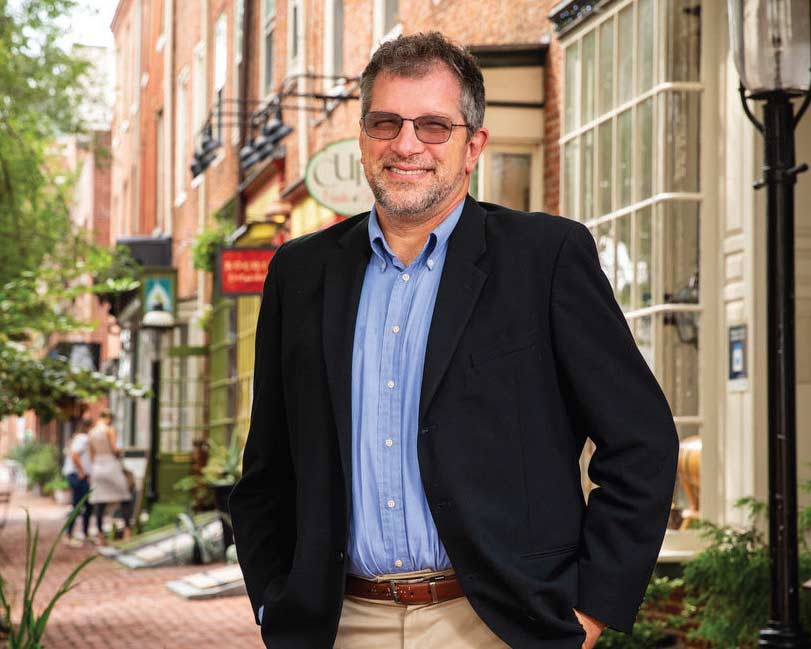
As restrictions ease throughout the region, entrepreneurs and small business owners are cautiously optimistic about resuming business. In June, Cocktail Culture hosted their first event in over a year, and although Park has had to downsize her team due to the pandemic, she exudes a refreshingly authentic positivity when talking about the future.
Like many successful entrepreneurs, Park has persevered through her tenacity, resilience and ability to pivot in a difficult moment. She attributed her ability to push forward despite the great losses she suffered in part to having survived a house fire in 2017.
"When you go through something traumatic like that, it's not just losing physical items," says Park. "It's mental too, it drains you. I've had to learn how to bounce back because it totally flips your life upside down. That experience has become a big factor in my life and the way I think. You have to accept the bad as a lesson, so you can evaluate reality, but that can't be your only focus. It's about developing a positive mentality."
CHR's services also reached South Philly's vibrant business districts during the pandemic. Michael Harris is the executive director for the South Street Headhouse District, which houses an estimated 400 businesses, many of whom were struggling to stay afloat at the time. South Street was paired with one of CHR's three student groups, whose research sought to capture the district's diverse business interests and synthesize a cohesive brand identity for messaging moving forward.
"In March and April, we were dealing with the shock of things and trying to figure out what it would mean for our businesses," says Harris. "We moved into a communication phase where we were communicating both ways; to businesses directly and to the public, who were looking to support businesses. I really appreciate the output from the center, it was extremely valuable."
The last year has given us a chance to reflect on what is important to us. Our community never stops helping each other rise to new opportunities. In this article, we look at the ways in which some members of the Fox Board of Visitors (BOV) dedicate their time, expertise and wisdom to educating future business professionals, managers and leaders.
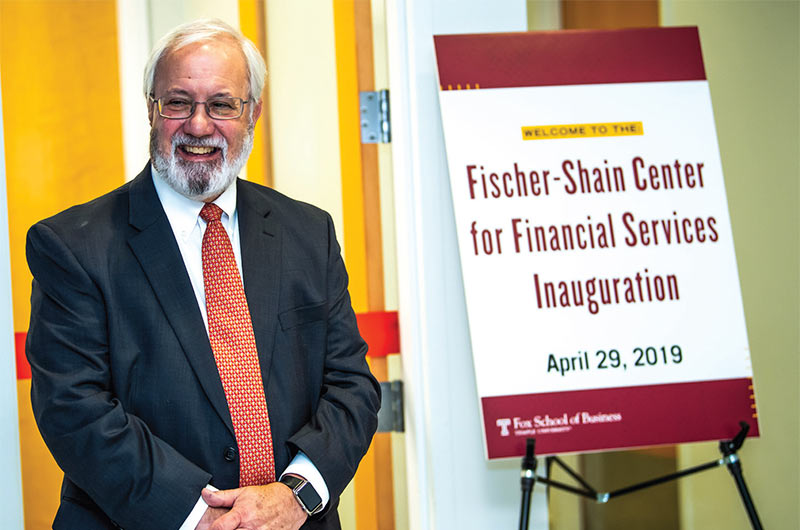
John Shain, BBA '73, chair of the Fox Board of Visitors (BOV), has made a career of giving back to Temple and the Fox School. "I have a long history as a student, researcher, alumnus, friend and supporter of the school," says Shain. "I am all-in on the Fox School's mission to provide an excellent education to all, regardless of their means."
As an undergraduate, Shain worked as a research assistant to finance Professor Jerry Fisher, who was in many ways a mentor to Shain. After graduating, Shain founded a company that was bought by Automated Financial Systems (AFS), where he most recently served as president and COO. Shain earned his master's degree at the Wharton School.
To honor his mentor and drive the financial services industry forward, Shain created the Fischer-Shain Center at the Fox School. Yet Shain's commitment stretches well beyond his investment in education and research.
"As chairman, I enjoy a unique perspective across all of the Fox School and how its leadership provides excellent education and research that impacts our local economy, industry and the tremendous outcomes for our students and alumni," Shain says. "It is a position that allows me to have a broad interaction with school leadership and help them continue to enhance the outcomes for Fox students, which is our first priority."
Shain advises the school's leadership team as they set the Fox Strategic Plan in motion. Yet Shain, who retired earlier this year, seeks to have an increased impact at Temple. He has spoken to potential students during recruiting season, lectured in the classroom and most recently served as an MBA coach.
"Coaching, recruiting, lecturing —these are opportunities to have a deeper, more direct impact on a smaller segment of students," Shain says. "By coaching a Fox MBA student, I am hoping that I can help them use their graduate degree to achieve an even more advanced position in their career. My hope is that they recognize and achieve everything they are capable of—everything that is possible."
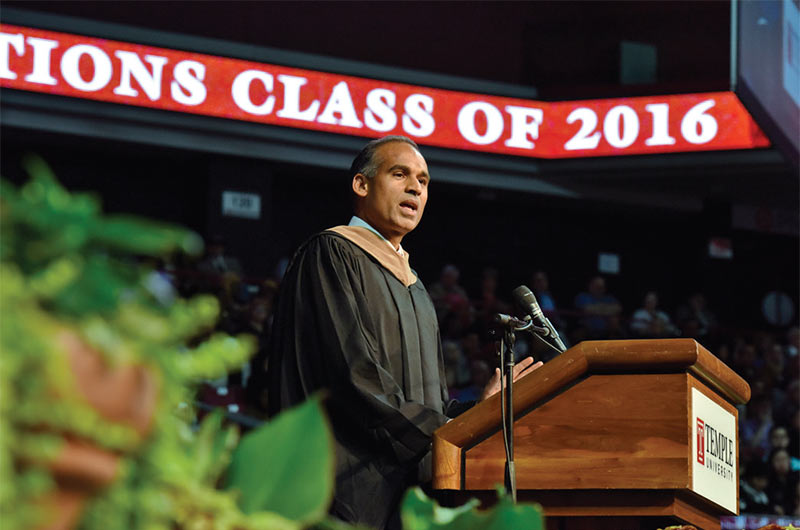
Through the Coaching Masters program, coaches meet with full-time MBA students in person or by phone to share their insights and professional experiences. This provides students with an opportunity to network in their chosen profession and guidance on how to achieve their goals. The program also helps create a network of our most accomplished alumni and soon-to-be youngest alumni cohort—two generations of Owls with a shared affinity for the Fox School.
For Bob Patel, EMBA '99, and CEO of LyondellBasell, the coaching program empowers him to add sharing his broad experience as a business leader to his existing investment is student success through scholarships.
"If my experience and being a sounding board can help somebody unlock their potential, for me it is time well spent," says Patel, who earlier this year was named to the board of directors for the Houston Branch of the Federal Reserve. "Especially if it is someone who doesn't have those people in their life—natural mentors or coaches for them and to create a safe environment to talk about things."
Before earning his executive MBA at Temple, Patel graduated from The Ohio State University with a degree in chemical engineering. Patel held positions of increasing and diverse responsibility at Chevron Corporation and Chevron Phillips Chemical Company that took him to leadership positions in the Netherlands, Singapore and the U.S.
He joined LyondellBasell during a transition and restructuring period for the company before becoming CEO. Patel serves on numerous boards in addition to his roles with the Federal Reserve and the Fox School—all of which provide a robust background for advising students.
"Before I took any job, I always asked myself two questions, ‘Can I contribute?' and ‘Will I learn something?' The more you learn, the more you are building a foundation of knowledge for your next step," Patel says.
He said much of his experience with the student he was coaching centered on preparing her for an internship. He said he knows the management at the company and was able to provide her with some insight into what they were looking for out of her position.
As to why it was important for him to give back to his alma mater, Patel traces it back to his upbringing by his mother and his uncle.
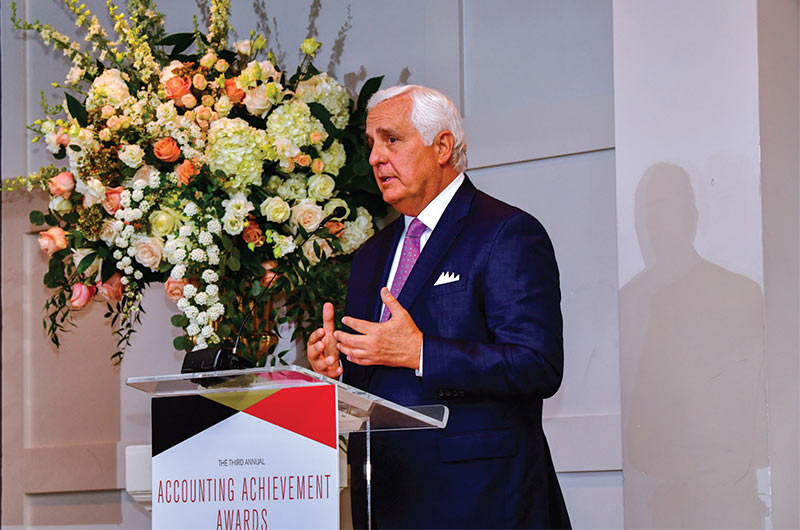
Richard Haverstick, BBA '74, is a member of the Board of Visitors and the Accounting Circle, an advisory board for the Fox Accounting Department focused on the strategic plan for the department. Haverstick is a board member with Global Beta EFT Trust and the Brandywine Realty Trust. He is a former chair of the Thomas Jefferson University and Jefferson Health System and a former Managing Partner at Ernst & Young LLP.
"I find purpose in my engagement with Temple," Haverstick says. "My commitment of time and resources is a reflection of that purpose. I also support Temple's mission through an endowment for accounting scholarships for underrepresented minorities. I choose to support Temple's commitment to diversity which is an important differentiator in the student experience at Temple. I believe through scholarships I can have the greatest impact."
As a member of the Accounting Circle, Haverstick is a frequent guest lecturer and advises the department's leadership on developments from the professional realm.
"Despite having built my career in a highly technical and highly regulated field, I'm drawn to speaking of the importance of building a professional network at all phases of one's career," Haverstick says. "It's a nontechnical and time-tested message that applies in almost every aspect of business. I've experienced the personal and professional benefits of a rich network, and I know I was fortunate to learn the value from my mentors early in my career."
Haverstick credits Temple as a source of many relationships that helped him advance in that career.
"What drives me today is the cumulative effect of a long and meaningful relationship begun while I matriculated [to Temple]," Haverstick says. "There's no doubt the wonderful career path I chose was strongly influenced by Temple accounting faculty and alumni I had the good fortune of getting to know. My earliest mentor was esteemed accounting Professor Jim Solano who is a good friend to this day. I was delighted that my first employer, Arthur Young & Company, encouraged me to continue my relationship with the Accounting Department through recruiting activities for the firm."
Haverstick said he continued to cultivate new relationships at the school as his career progressed and that helped to sharpen his appreciation of Temple's role in our city and region. "I feel privileged to have had the opportunity to contribute my time and talents for the betterment of such a great institution."
